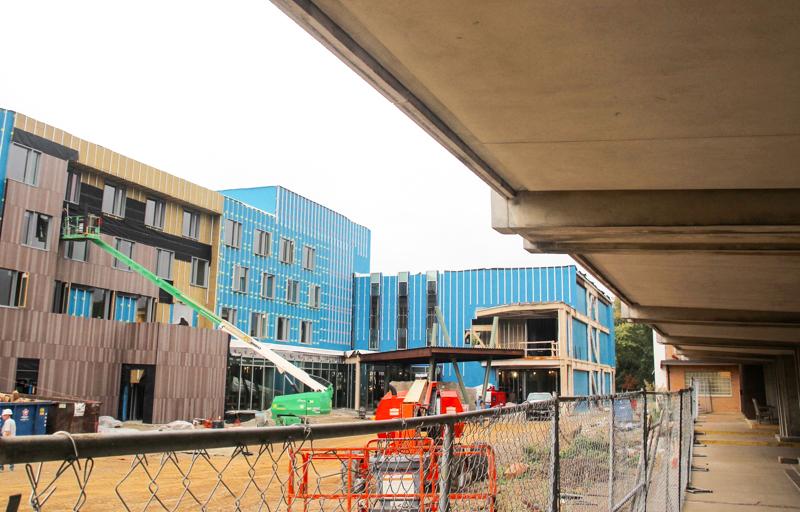Business Owners Battle Loss of Downtown Parking
Construction continues at the site of the new Peter B. Lewis Gateway Center downtown. The site has been a recent source of contention with the potential loss of on-street parking spaces.
October 2, 2015
As construction on the Peter B. Lewis Gateway Center makes daily progress, downtown business owners are growing increasingly concerned about the lack of street parking in the new building’s plans.
The parking spots of contention are between North Pleasant Street and Main Street. The business owners of Slow Train Cafe and The Feve, as well as others, fear that the depletion of parking spaces could result in the loss of customers.
“We are concerned that the parking situation will affect our business but are hopeful that the College and the city can come to an agreement which will be beneficial for all involved parties,” said Blake New, Slow Train Cafe owner and men’s soccer head coach at the College. “From our viewpoint, there are some easy solutions, but neither party seems to be willing to work together to find one.”
The city is working with the College and the developer to design those needed parking spaces, but ultimately the city will have the final say on what happens.
“We’re trying to come up with options to put parking somewhere else along East College Street,” said City of Oberlin Planning and Development Director Carrie Handy. “We know that parking is important for all of our downtown businesses.”
Co-owner of The Feve and the project’s Volunteer Planning Commissioner Matt Adelman described parking as the major sticking point at the beginning of the project. He said that the Planning Commission, which is mostly composed of residents and concerned businesses, has been “fighting tooth and nail for [parking].”
The commission wanted a parking garage to go along with the Gateway Center, but the garage was not built, as the College claimed not to have enough money.
Last Friday, representatives from the design firm SMART Hotels met with Handy, the fire chief, the city manager, the public works director, city engineer, the civil engineer from the College and other city staff. The addition of seven parking spaces was discussed, but the group made little progress in the meeting.
According to city officials, they cannot add more parking in front of the Center because of public safety concerns and the fire code.
Adelman, however, believes the city’s fire code concerns to be baseless because the building is made of fire-retardant Roxul insulation.
“As was said to me by one of the developers of this project, ‘You could literally douse it with gasoline and light it with a torch and it would not burn,’” Adelman said. “The idea that the lack of parking spaces is [due to] fire safety is really a stretch. … The city is playing hardball with the College, perpetuating a bad relationship with the College to the detriment of local businesses.”
City Manager Eric Norenberg responded to Adelmen’s comments in an email to the Review, stating, “nothing could be further from the truth.”
“City staff have worked with the project team since 2012 with a goal of seeing this project succeed,” Norenberg said. “We know it will be an important addition to downtown. Application of fire and other code requirements is about public safety. We are working with Oberlin College staff to establish some on-street parking, while ensuring that the safety of guests and patrons isn’t compromised.”
Oberlin Fire Department Chief Robert Hanmer added that the Gateway Center is made of fireresistant materials but that this does not address the entirety of potential fire hazards in the building.
“I have to look at the contents that will be used inside of the building,” Hanmer said in an email to the Review. “Virtually everything you can see inside of the building can and will burn, and this does not even address all of [the] hidden components.”
According to Adelman, if the situation doesn’t change and the Gateway Center only adds seven parking spaces, new and old businesses alike will suffer.
“The businesses that are here are struggling. Think about [Magpie’s], where there is nowhere to park your car to carry out a pizza. … People have driven past these restaurants because there is nowhere to park, and the same thing is going to happen with the Gateway Project.”
Negotiations will continue until a settlement can be reached between the project’s planners and disgruntled business owners. Tita Reed, assistant to the president for community and government relations, said the College is working on restoring the parking spaces.
“We’re standing right there with the local merchants,” Reed said. “We are in support of restoring the on-street local parking.”

























